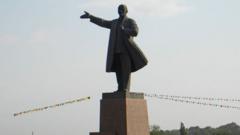Following the Russian invasion, Odesa faces a stark cultural battle over the proposed removal of Isaac Babel’s statue—a symbol of its rich multicultural history—amidst efforts to erase Russian imperial influences.
Odesa's Cultural Clash: The Battle for Identity Amidst War

Odesa's Cultural Clash: The Battle for Identity Amidst War
The ongoing conflict in Ukraine has ignited a heated debate in Odesa over the decolonization law, sparking tensions around heritage, identity, and the city's multicultural roots.
In the Black Sea city of Odesa, Ukraine, a fierce cultural war has erupted against the backdrop of the ongoing conflict with Russia. The proposed dismantling of a bronze statue honoring Isaac Babel—an influential writer known for capturing the city’s diverse spirit in his works—has ignited passionate debates among residents. The statue now faces removal under a decolonization law aimed at eliminating symbols of Russian imperialism, which local authorities believe threaten Ukrainian identity.
The law signals a large-scale initiative to sever historical ties with Russia during wartime and redefine Ukrainian culture. However, many Odesans, including Antonina Poletti, editor of a local news outlet and a sixth-generation resident, argue that removing Babel would erase an essential component of their city’s spirit. "You can’t remove Babel," she insists. "If you remove him, you remove the soul of the city."
Babel's connection to Odesa is deeply woven into the city’s identity, as his acclaimed "Odessa Stories" portray a rich tapestry of Jewish heritage and an array of ethnic backgrounds thriving together in a community marked by both creativity and hardship. The pushback against the statue's removal reflects wider concerns about the impacts of war on cultural heritage, with many residents fearing that such actions could lead to a homogenization of their city's unique identity.
As the war continues and Russian drones rain down on the city, Odesa navigates these complex emotional and cultural territories, seeking to honor its past while adapting to the pressures of conflict. The fate of Babel’s statue serves as a battleground not only for opinions on decolonization but also for a broader conversation about what it means to be Odesan in these trying times. How the city balances the pain of conflict with the pride in its multicultural roots remains to be seen.





















